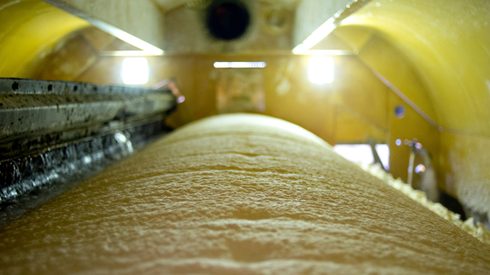Prices for pulp imports into China have dropped sharply this week, with bleached softwood kraft (BSK) pulp falling by up to $60 per tonne and bleached hardwood kraft (BHK) plunging $110-120 per tonne.
The erosion followed a two-month stalemate in talks between international sellers and Chinese buyers, during which suppliers declined to give in to pressure from customers for price cuts for the two key grades, resulting in business slowing a trickle.
Arauco was the first supplier to announce a cut of $55 per tonne for radiata pine and reduced the grade’s list price to $765 per tonne on July 25. But the Chilean producer made no offer for BHK at that time.
Sources indicated that buyers’ early responses to the Arauco announcement were lukewarm, and were apparently waiting for other major supplies’ reaction to the decrease.
Earlier this week, customers heard that a major Nordic producer declined to follow suit, citing high costs especially in woodchips and setting the list price of their northern BSK (NBSK) at $820 per tonne, while another Nordic supplier revised down their NBSK list price to $800 per tonne.
Buyers subsequently flocked to Arauco and other suppliers who cut NBSK prices to $760 per tonne and talks kicked off.
Meanwhile, on Tuesday July 30, Suzano announced a list price of $650 per tonne for BHK, down by $100 per tonne, and other sellers followed suit, including Arauco and Bracell. Following this, buyers and sellers finally began talks.
BSK prices are down
Several clients had reached a preliminary agreement with suppliers before the Arauco announcement consenting to a BSK price between $760-770 per tonne. But other customers were pushing for more cuts after that.
Those buyers pointed to low BSK resale and futures prices, seeking to pay as low as $700 per tonne for the grade.
Resale NBSK level edged down by RMB 14 per tonne from last week to RMB 6,168 per tonne this week in the domestic market, which was equivalent to $735 per tonne, excluding 13% value-added tax (VAT) and RMB 150 per tonne in logistics costs for resale pulp.
The gap in price perspective narrowed, after suppliers reduced offer prices for NBSK from Canada and the Nordic region to $760 per tonne.
Traders began to snap up volume to replenish depleted BSK stocks, while Arauco has sold just their July allotment, rather than the two months’ tonnage that buyers had previously projected.
Despite buyers’ push, suppliers managed to hold the line at $740 per tonne.
As of Thursday August 1, prices for NBSK from Canada and the Nordic region were assessed at $740-760 per tonne, down by $60 per tonne from a fortnight early, with the midpoint for the grade also dipping by $60 per tonne to $750 per tonne.
Radiata pine changed hands at $745-760 per tonne, down by $45-50 per tonne.
Buyers believe there is room for more price drops in view of sluggish futures and the widening gap between resale BSK and BHK levels.
The most-traded September BSK contract on the Shanghai Futures Exchange settled at RMB 5,746 per tonne Thursday, which was equivalent to $687 per tonne, minus VAT and RMB 120 per tonne in logistics costs.
BHK plummets
Although suppliers reduced offer price for South American BHK to $650 per tonne this week, buyers were relentless in pushing for deeper cuts, with some asking below $600 per tonne and others below $550 per tonne.
Most suppliers were selling their July allotments.
A disgruntled customer said that sellers’ July prices were supposed to be announced around June 20, which was what had been done in the past, and August prices should be out around July 20.
“Suzano’s July price was announced on July 30. What about August price?” the source said.
The buyer source indicated that suppliers held out an olive branch by offering South American BHK at $650 per tonne, while saying sellers implied further price drops were possible in August, if the situation is little improved.
A Brazilian producer similarly said the most important thing was buyers were returning to the negotiation table and getting business rolling, adding that suppliers already offered a gesture of conciliation and were willing to adjust prices in line with the Chinese market.
The seller said they were okay with customers reducing monthly contract volumes for July business, adding “We hope to see the price gap between BHK imports and resale shrink after sellers took the first strategic step.”
Sources stressed that large mills with in-house pulp production were more receptive to not cutting BHK prices too steep for July, due in part to its impact on domestic paper and board market, but that small and medium-sized mills and traders were seeking much lower prices.
“I believe BHK prices will continue to fall in August and how deep they will go depends on how much volume sellers will sell for July orders and how resale BHK will react,” a trader said.
Several buyers reportedly agreed to buy 50% of their July volumes.
A major Brazilian supplier told Fastmarkets 70% of their July allotment had been sold as of Thursday.
In the meantime, prices for resale South American BHK nose-dived by RMB 460 per tonne from last week to RMB 5,030 per tonne this week, which was equivalent to $596 per tonne, excluding VAT and logistics costs, not a positive sign for market stabilization.
Price for South American BHK were settled at $620-640 per tonne, according to sellers and buyers.
Sources reported that Chinese customers already told international suppliers their plans to reduce contract volumes of South American BHK next year.
These buyers made that decision reportedly based on the start-up of Liansheng Pulp & Paper’s 1.7-million-tonne-per-year BHK mill in Fujian, China; the Chinese firm told buyers its plans to sell the output in August and prices would be lower by RMB 50 per tonne than market levels, because the new pulp belongs to output during trial runs on the BHK line.
Another looming factor that is expected to roil the market is the commissioning of Suzano’s 2.55-million-tpy Cerrado project in Brazil on July 21. The producer has not yet disclosed when the product will be sold in China.
“How will the European and North American markets react to the price falls in China will decide how pricing will be going forward,” a pundit said.





